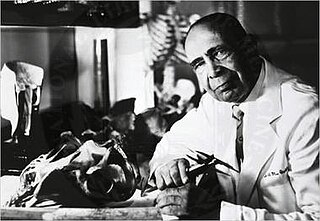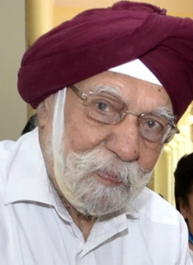Related Research Articles

Biological anthropology, also known as physical anthropology, is a scientific discipline concerned with the biological and behavioral aspects of human beings, their extinct hominin ancestors, and related non-human primates, particularly from an evolutionary perspective. This subfield of anthropology systematically studies human beings from a biological perspective.
Auxology is a meta-term covering the study of all aspects of human physical growth. Auxology is a multi-disciplinary science involving health sciences/medicine, and to a lesser extent: nutrition science, genetics, anthropology, anthropometry, ergonomics, history, economic history, economics, socio-economics, sociology, public health, and psychology, among others.
Stanley Marion Garn Ph.D. was a human biologist and educator. He was Professor of Anthropology at the College for Literature, Science and Arts and Professor of Nutrition at the School of Public Health at the University of Michigan. He joined the University of Michigan in 1968.
Biocultural anthropology can be defined in numerous ways. It is the scientific exploration of the relationships between human biology and culture. "Instead of looking for the underlying biological roots of human behavior, biocultural anthropology attempts to understand how culture affects our biological capacities and limitations."
Fatimah Linda Collier Jackson is an American biologist and anthropologist. She is a professor of biology at Howard University and Director of its Cobb Research Laboratory.

William Montague Cobb (1904–1990) was an American board-certified physician and a physical anthropologist. As the first African-American Ph.D in anthropology, and the only one until after the Korean War, his main focus in the anthropological discipline was studying the idea of race and its negative impact on communities of color. He was also the first African-American President of the National Association for the Advancement of Colored People. His career both as a physician and a professor at Howard University was dedicated to the advancement of African-American researchers and he was heavily involved in civil rights activism. Cobb wrote prolifically and contributed both popular and scholarly articles during the course of his career. His work has been noted as a significant contribution to the development of the sub-discipline of biocultural anthropology during the first half of the 20th century. Cobb was also an accomplished educator and taught over 5000 students in the social and health sciences during his lifetime.

Alan H. Goodman is a biological anthropologist and author. He served as president of the American Anthropological Association from 2005 to 2007. With Yolanda Moses, he co-directs the American Anthropological Association's Public Education Project on Race. His teaching, research and writing focuses on understanding how poverty, inequality and racism “get under the skin.” He received his PhD from the University of Massachusetts Amherst. Goodman was a pre-doctoral research fellow in stress physiology at the Karolinska Institute, Stockholm and a postdoctoral fellow in international nutrition at the University of Connecticut and the Salvador Zubirán National Institute of Health Sciences and Nutrition, Mexico.
George J. Armelagos was an American anthropologist, and Goodrich C. White Professor of Anthropology at Emory University in Atlanta, Georgia. Armelagos significantly impacted the field of physical anthropology and biological anthropology. His work has provided invaluable contributions to the theoretical and methodological understanding human disease, diet and human variation within an evolutionary context. Relevant topics include epidemiology, paleopathology, paleodemography, bioarchaeology, evolutionary medicine, and the social interpretations of race, among others.
The concept of nurture kinship in the anthropological study of human social relationships (kinship) highlights the extent to which such relationships are brought into being through the performance of various acts of nurture between individuals. Additionally the concept highlights ethnographic findings that, in a wide swath of human societies, people understand, conceptualize and symbolize their relationships predominantly in terms of giving, receiving and sharing nurture. The concept stands in contrast to the earlier anthropological concepts of human kinship relations being fundamentally based on "blood ties", some other form of shared substance, or a proxy for these, and the accompanying notion that people universally understand their social relationships predominantly in these terms.
Alice Mossie Brues was a physical anthropologist.
Mark David Pagel FRS is an evolutionary biologist and professor. He heads the Evolutionary Biology Group at the University of Reading. He is known for comparative studies in evolutionary biology. In 1994, with his spouse, anthropologist Ruth Mace, Pagel pioneered the Comparative Method in Anthropology.

Paul Thornell Baker was Evan Pugh Professor Emeritus of Anthropology at the Pennsylvania State University, and was “one of the most influential biological anthropologists of his generation, contributing substantially to the transformation of the field from a largely descriptive to a hypothesis-driven science in the latter half of the 20th century. He pioneered multidisciplinary field science, firmly established a place for biological anthropology and human population biology in national and international science, and trained a host of graduate students in good science, who, in turn, continued his commitment to collaborative research.”
High-altitude adaptation in humans is an instance of evolutionary modification in certain human populations, including those of Tibet in Asia, the Andes of the Americas, and Ethiopia in Africa, who have acquired the ability to survive at altitudes above 2,500 meters. This adaptation means irreversible, long-term physiological responses to high-altitude environments, associated with heritable behavioural and genetic changes. While the rest of the human population would suffer serious health consequences, the indigenous inhabitants of these regions thrive well in the highest parts of the world. These humans have undergone extensive physiological and genetic changes, particularly in the regulatory systems of oxygen respiration and blood circulation, when compared to the general lowland population.
Cynthia Beall is an American physical anthropologist at the Case Western Reserve University, Cleveland, Ohio. Four decades of her research on people living in extremely high mountains became the frontier in understanding human evolution and high-altitude adaptation. Her groundbreaking works among the Andean, Tibetan and East African highlanders are the basis of our knowledge on adaptation to hypoxic condition and how it influences the evolutionary selection in modern humans. She is currently the Distinguished University Professor, and member of the U.S. National Academy of Sciences and the American Philosophical Society.
William Irons is an American evolutionary anthropologist and professor emeritus in anthropology at the Northwestern University known for his research on the Yomut Turkmen, in northern Iran. His research interests include evolutionary ecology, reproductive strategies, demography and the evolutionary foundations of morality and religion.
Clark Spencer Larsen is an American biological anthropologist, author, and educator. His work focuses on bioarchaeology, the study of human remains from archaeological settings. Although his interests span the entire record of human evolution, his research largely pertains to the last 10,000 years, a period of dynamic change in health, well-being, and lifestyle, much of which relates to population increase, overcrowding, and nutritional decline that co-occurred with the transition from hunting and gathering to agriculture, creating living conditions that humans are grappling with to the present day.
Gabriel Ward Lasker was a British-born American biological anthropologist. He taught anatomy at Wayne State University School of Medicine for 36 years and served as editor-in-chief of the scientific journal Human Biology for 35 years. He was a Fulbright Scholar in Peru in 1957–58. He served as president of the American Association of Physical Anthropologists from 1963 to 1965 and received their Charles R. Darwin Lifetime Achievement Award in 1993. In 1974, he founded the Human Biology Council as a society that supported the publication of Human Biology.

Luis Eduardo Valcárcel Vizcarra was a Peruvian historian, anthropologist, writer and activist. He was a researcher of pre-Hispanic Peru and one of the protagonists of the Indigenismo movement. He is considered the father of Peruvian anthropology, and his work focused on two fundamental axes: the revaluation of the Inca Empire and the vindication of the Andean culture. He brought awareness to the continuity that links the peasant of the Andes with the man of the Tahuantinsuyu.

Indera Paul Singh was an Indian anthropologist who had served at prominent positions in several Indian and international anthropological organizations.
Peter Thorpe Ellison is an American anthropologist who researches human reproductive ecology. His work has been recognized with a Guggenheim Fellowship and membership of the National Academy of Sciences, among other honors. He has also served as the editor-in-chief of the American Journal of Human Biology and American Journal of Physical Anthropology and editor of Annual Review of Anthropology.
References
- ↑ Leonard, William R (2009). "Contributions of A. Roberto Frisancho to human population biology: an introduction". Am. J. Hum. Biol. United States. 21 (5): 599–605. doi: 10.1002/ajhb.20916 . PMID 19367580.